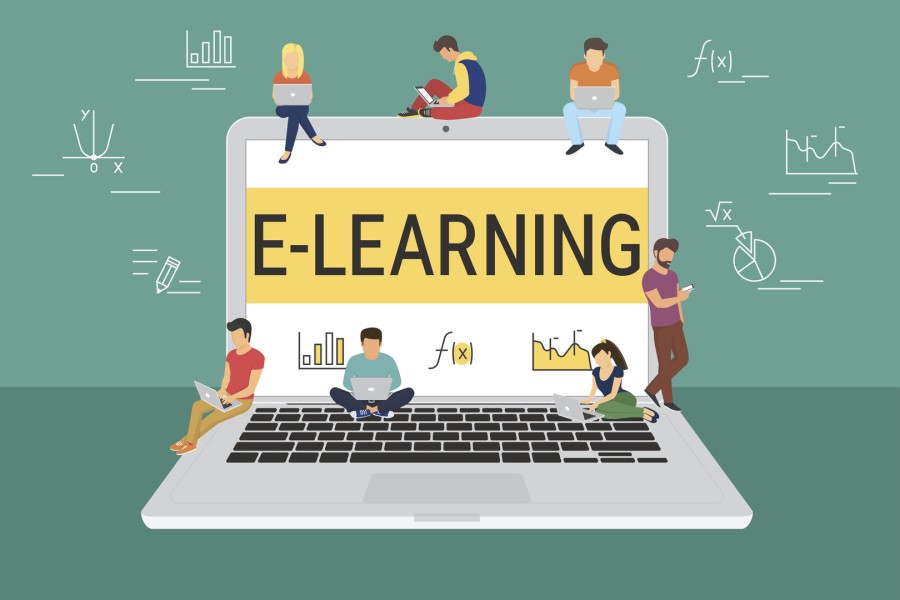
By: TP Sharfudheen
It is an inevitable necessity; as education has already taken to the online platform for comfortable deployment at the moment. And this trend likely will continue even after the lockdown phase or even after the pandemic is over.
Online based digital learning is often more adaptive than in-person or any type of offline teaching and learning programs. The vibrant nature of updates, methods, and techniques for synchronized education is exponentially improving. Especially for the generation ‘z’ who are neurologically more exposed to the digital space, it has become a preferred learning tool. Adult education and corporate training programs have also become part of the same trend globally, is cost-effective and highly productive. The well-designed engaging flipped content can address core areas for learners’ needs, style, preference and pace to engage, absorb, and retain.

Scalability, adaptability, making use of resourceful expert trainers or teachers surely benefits a large number of learners. Optimal utilization of time, reducing the operation cost will help to reduce training costs in turn and a more effective assessment for learning, would be possible. Online trainings make it possible to evaluate and monitor challenges, success rate of the system by gauging learning retention, quality teaching, and learner engagement. A sensor-based intelligent learning management system can also produce reporting and analysis which of course is vital. Considering all these factors, we can confidently assume that the term of 1999 e-learning is becoming a big reality in this era.
The online infrastructure and digital readiness play a vital role in the growth of online education which shows a huge upward trend globally. The unprecedented growth of digital readiness has accelerated this trend tremendously as per the latest statistics of various agencies in 2019. The active internet users’ figure has already crossed 4.57 billion which is 60% of the world population.
The digital user penetration growth between 2000 to 2020 shows as 11559% in the Asian continent, 5395% in the Middle East itself, Africa 1913% and Europe 592%. Europe tops the chart as of now with 87% of its population being active internet users while the world average growth of internet users is 58.7%. Yemen records the lowest internet speed currently which is 0.38 Mbps and Taiwan records the highest speed which exceeds 85.2 Mbps most times. A total of 141 countries have an average speed of 10 Mbps, while the world average rise in speed each year is estimated at 20.65%.
Currently there are 3.5 billion mobile phone users globally and that number is touching 3.8 billion soon. Before the corona impact, a study had revealed that world’s internet users will spend more than 1.25 billion years of human time online in 2020 alone. This estimate of course was before the corona impact and with the current scenario of remote working and lockdowns the numbers will definitely rise. These statistics show the digital dwelling of human beings and this factor again emphasizes the opportunity and growth of e-learning and online education.

The successful online education agencies use a variety of compelling methods and strategies to retain the students like simulating videos, text lessons, PDF resources and some e-learning platforms are also using augmented reality and virtual reality content too. These are great for simulating a connection between the instructor and the participant and the variety in content types also enables diversified learning styles. Besides live virtual classrooms, self-paced adaptive courses can be a good option for some students, and a user-based learner model helps create learner understanding sensor capability for the intelligent LMS. The self-paced online learning platform will indeed revolutionize the education ecosystem to a bigger and popular frame.
The trend emphasizes the fact that, online education is not simply an option but in many cases a necessity. The world lockdown has drastically made a macro leveling in our thinking pattern to accept reality. The corporate human resource managers say that online training practice is rapidly expanding its preferences and transforming into a way to be connected and informed. It’s no longer a ‘nice to have’ idea for businesses; it’s necessary to reach their clientele, both locally and abroad.
In the platformized subscription economy, it’s easy for a learner to switch to another training provider, so retaining a customer you have worked so hard to acquire, becomes that much more important. The faster you educate customers on their products and services, the faster they will derive value and stay with them. Educating through the wide-reaching internet platform is the best option even for product developers too.
New York times marked the year 2012 as the year of MOOCs in the context of the massive open online content providers in the education segment like edex, coursera, Udemy, and audacity, etc. They gathered the attention of millions of people across countries but in the consequent years itself, it brought a bad impression in academic circles because of the 90% attrition, lack of accreditation and absence of credit merits. But the year 2020 drastically changed these perceptions and brought back a different image for these platforms. Many universities themselves have started thinking on the lines of giving an online certificate of nano degrees and credit merits. It will also help governments at a big level, especially for countries with lack of educational infrastructure, budget deficit etc.
Considering these factors, online education is the best solution to address many of the challenges we face in human resource development and the creative engagement of people. We are socially responsible for this mission. Governments, investors, academicians, technologists, universities and each individual needs to take this responsibility and make use of the opportunity for the benefit of humankind. It is a fire now and an undeniable massive online open reality.
